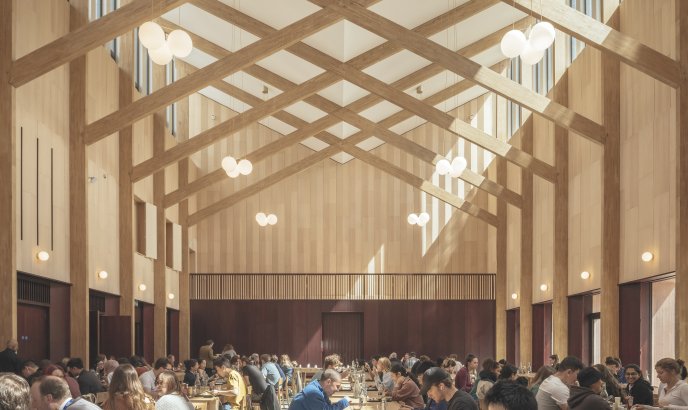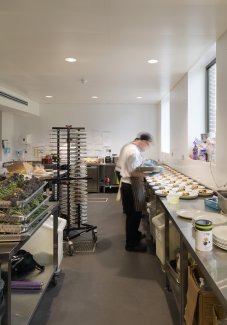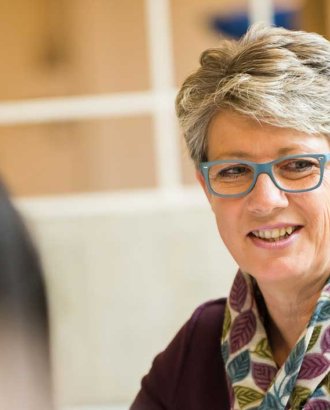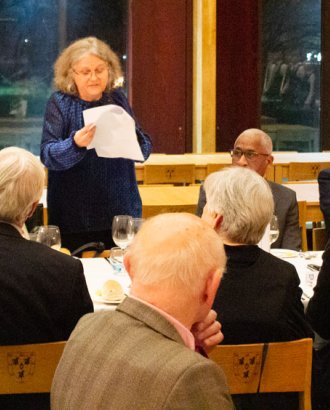Homerton College's magnificent new Dining Hall continues to garner awards.
At a ceremony on 13 March it was voted the best building over £2m built in Greater Cambridge last year - having swept the board at the national Wood Awards in 2022, winning the overall Gold Award as well as a structural award. At the Greater Cambridge awards, the building was also joint winner of the Craftsmanship Award and was commended in the David Mackay Engineering and Sustainability category.
The judges for the awards said "This stunning addition to Cambridge’s largest College provides a benchmark for what can be done through an ambitious multi-dimensional brief, a sympathetic and visionary architect, a deeply engaged client and a highly skilled construction/delivery team".
Homerton's dining hall was designed by Feilden Fowles architects. The structural engineers were Structure Workshop and Barnes Construction turned the vision into reality. The hall was especially commended by the Greater Cambridge judges for its sensitivity to place, the thoughtfulness of its materials and craftsmanship, and its sustainable credentials.
The new hall is bold and creative, but still very respectful of its neighbouring older buildings. The inverted V of the roof is an inversion of the steep peak of the Great Hall; the flèche of the Great Hall is repeated in the patterns of the 3,200 tiles of the ceramic exterior; the pink concrete picks up tones from the brickwork from South Court across the lawns, and the use of flint studs in the Harrison Drive elevation is copied from the adjacent 1914 Ibberson Building.
Crucially, the building's low-tech design philosophy is a very deliberate response to the climate crisis - and so the project already exceeds the targets in RIBA's 2030 Climate Challenge. The Challenge focuses on the four areas of operational energy, embodied carbon, potable water use, and health and wellbeing. In the Homerton building, the sustainably sourced wood throughout the interiors contributes to low embodied carbon, and both diners and catering staff experience the wellbeing benefits of an airy and light-filled building, with views across the green fields of the College estate.
As Rowan Moore noted in his review for The Observer, the long and impossibly slender sweet chestnut trusses supporting the roof are "held together with interlocking joints and wooden pegs without any steel bolts or plates.........an example of the sort of unasked for thoughtfulness in which the building abounds".
It is no surprise that the architectural press rates Cambridge among the most exciting places for contemporary architecture, largely thanks to imaginative commissions by the University and Colleges of Cambridge. Niall McLaughlin Architects were shortlisted for the Stirling Prize three times, but it was their commission for Magdalene College library that finally got them over the line in 2022. The Civil Engineering building by Grimshaw Architects and Trinity Hall's WongAvery Gallery - also Niall McLaughlin - have won attention in the last couple of years. And the Biomedical Campus a stone's throw from Homerton is a watering hole for cranes, with the Heart and Lung Research Institute (Fairhursts Design Group) and AstraZeneca's Discovery Centre (Herzog & de Meuron) among recent eye-catching projects.
For Homerton's commission, the College looked outside the 'usual suspects' of architectural firms and took a punt on a young partnership, which appeared to be a rising star. A rigorous architectural competition saw entries by garlanded practices, but Feilden Fowles - founded in 2009 - won the Homerton commission largely because of an alignment of values as well as vision. The company's London studio is also the home of Waterloo City Farm, a project the architects worked on pro bono. Lead architects Edmund Fowles and Eleanor Hedley are both Cambridge architecture graduates, and Ed recalls working in College kitchens over vacations: Homerton's aim of providing our catering staff with decent working conditions resonated strongly.
Homerton's Vice-Principal and chair of the College's Estates Committee, Dr Francesca Moore, thinks that the New Dining Hall is a groundbreaking building that leads the way for climate-resilient construction in the education sector.
She says "The Hall is a triumph of thoughtful design. It's an all-electric building with low embodied carbon, designed with a low-tech architectural approach to meet the challenge of a rapidly warming planet. We are immensely proud to have the building on the Homerton estate."
The Greater Cambridge Design and Construction Awards are hosted by the Greater Cambridge Shared Planning Service and the Cambridge Forum for the Construction Industry







